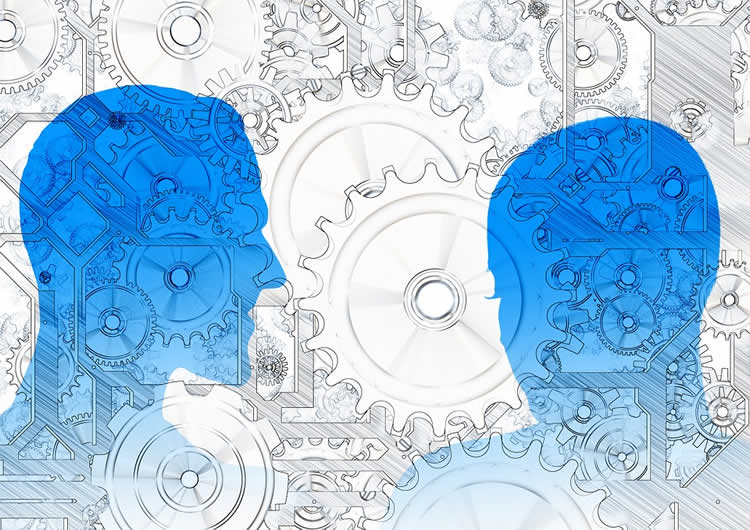Summary: A new study reports adults and older adolescents can learn certain thinking skills, such as non-verbal reasoning, more effectively than younger people.
Source: UCL.
Older adolescents and adults can learn certain thinking skills including non-verbal reasoning more effectively than younger people.
The study, published in Psychological Science, also highlights the fact that non-verbal reasoning skills can be readily trained and do not represent an innate, fixed ability.
“Although adults and older adolescents benefitted most from training in non-verbal reasoning, the average test score for adolescents aged 11-13 improved from 60% to 70% following three weeks of ten-minute online training sessions,” says senior author Professor Sarah-Jayne Blakemore (UCL Institute of Cognitive Neuroscience). “This calls into question the claim that entry tests for selective schools that include non-verbal reasoning ‘assess the true potential of every child’.”
The research involved 558 school pupils aged 11-18 and 105 adults, who were initially tested in various skills and then completed up to 20 days of online training in a particular skill before taking the tests again. They were then tested six months later to see whether the effect of training lasted.
The non-verbal reasoning test involved looking at a 3×3 grid of shapes with the final square left blank. Participants had to choose the correct shape to complete the pattern, and the shapes could vary by colour, size, shape and position. In another test, ‘numerosity discrimination’, participants were shown two groups of different coloured dots in quick succession and had to judge which group had the most dots.
“We find that these cognitive skills, which are related to mathematics performance, show greater training effects in late adolescence than earlier in adolescence,” explains co-lead author Dr Lisa Knoll. “These findings highlight the relevance of this late developmental stage for education and challenge the assumption that earlier is always better for learning. We find that fundamental cognitive skills related to mathematics can be significantly trained in late adolescence.”

At the testing stages, volunteers were tested on various tasks, not just the ones they had trained in, to see if the training effects transferred to other skills. No transfer effects were observed, suggesting that the effect of training was specific to each task.
“Some ‘brain training’ apps claim to improve your IQ by getting you to practise a specific task such as the non-verbal reasoning task we used in our experiment,” says co-lead author Ms Delia Fuhrmann (UCL Institute of Cognitive Neuroscience). “However, there is no evidence that this leads to an improvement in overall cognitive ability. All we can say for sure is that training to spot patterns in a 3×3 grid of abstract shapes improves your ability to spot patterns in a 3×3 grid of abstract shapes. While this ability is commonly tested in IQ tests, it might not be appropriate to make judgements about other forms of intelligence based on the outcomes of such tests.”
Source: Harry Dayantis – UCL
Image Source: NeuroscienceNews.com image is in the public domain.
Original Research: Full open access research for “A Window of Opportunity for Cognitive Training in Adolescence” by Lisa J. Knoll, Delia Fuhrmann, Ashok L. Sakhardande, Fabian Stamp, Maarten Speekenbrink, and Sarah-Jayne Blakemore in Psychological Science. Published online November 4 2016 doi:10.1177/0956797616671327
[cbtabs][cbtab title=”MLA”]UCL. “You Can Teach an ‘Older Dog’ New Tricks.” NeuroscienceNews. NeuroscienceNews, 5 November 2016.
<https://neurosciencenews.com/aging-thinking-learning-reasoning-5434/>.[/cbtab][cbtab title=”APA”]UCL. (2016, November 5). You Can Teach an ‘Older Dog’ New Tricks. NeuroscienceNews. Retrieved November 5, 2016 from https://neurosciencenews.com/aging-thinking-learning-reasoning-5434/[/cbtab][cbtab title=”Chicago”]UCL. “You Can Teach an ‘Older Dog’ New Tricks.” https://neurosciencenews.com/aging-thinking-learning-reasoning-5434/ (accessed November 5, 2016).[/cbtab][/cbtabs]
Abstract
A Window of Opportunity for Cognitive Training in Adolescence
In the current study, we investigated windows for enhanced learning of cognitive skills during adolescence. Six hundred thirty-three participants (11–33 years old) were divided into four age groups, and each participant was randomly allocated to one of three training groups. Each training group completed up to 20 days of online training in numerosity discrimination (i.e., discriminating small from large numbers of objects), relational reasoning (i.e., detecting abstract relationships between groups of items), or face perception (i.e., identifying differences in faces). Training yielded some improvement in performance on the numerosity-discrimination task, but only in older adolescents or adults. In contrast, training in relational reasoning improved performance on that task in all age groups, but training benefits were greater for people in late adolescence and adulthood than for people earlier in adolescence. Training did not increase performance on the face-perception task for any age group. Our findings suggest that for certain cognitive skills, training during late adolescence and adulthood yields greater improvement than training earlier in adolescence, which highlights the relevance of this late developmental stage for education.
“A Window of Opportunity for Cognitive Training in Adolescence” by Lisa J. Knoll, Delia Fuhrmann, Ashok L. Sakhardande, Fabian Stamp, Maarten Speekenbrink, and Sarah-Jayne Blakemore in Psychological Science. Published online November 4 2016 doi:10.1177/0956797616671327






